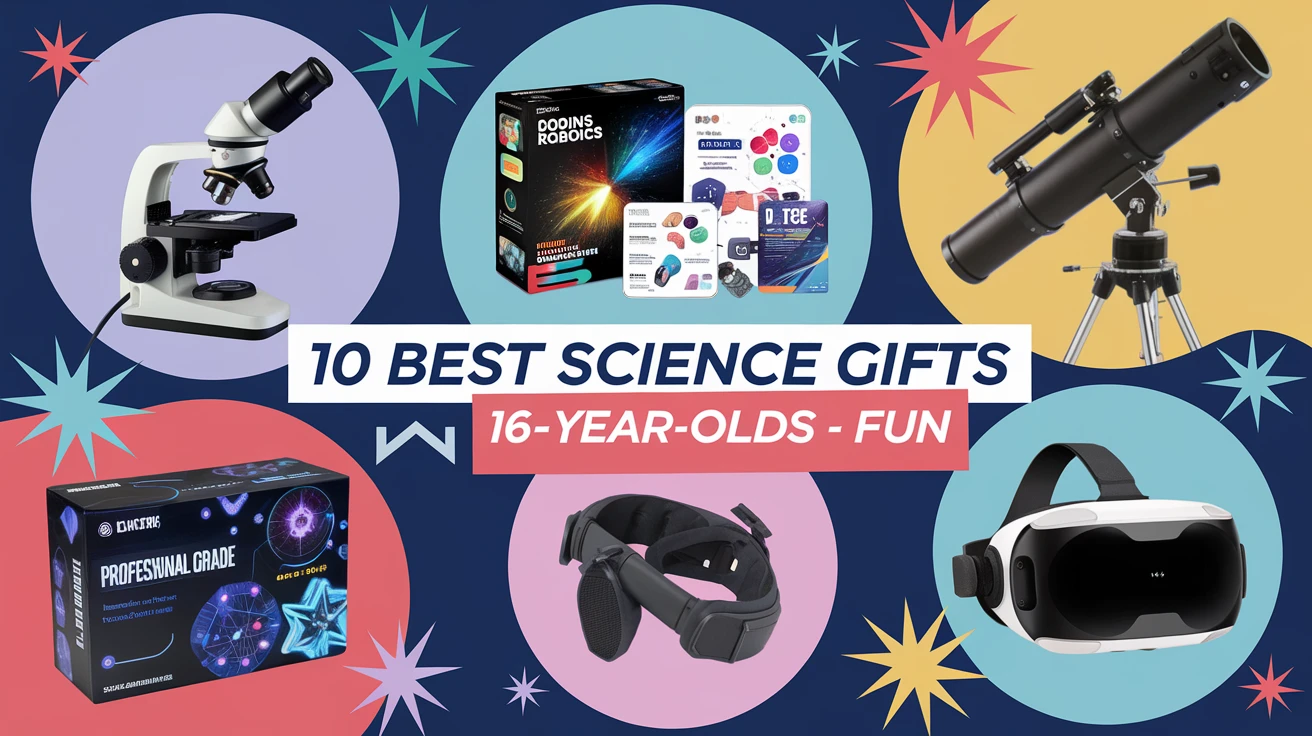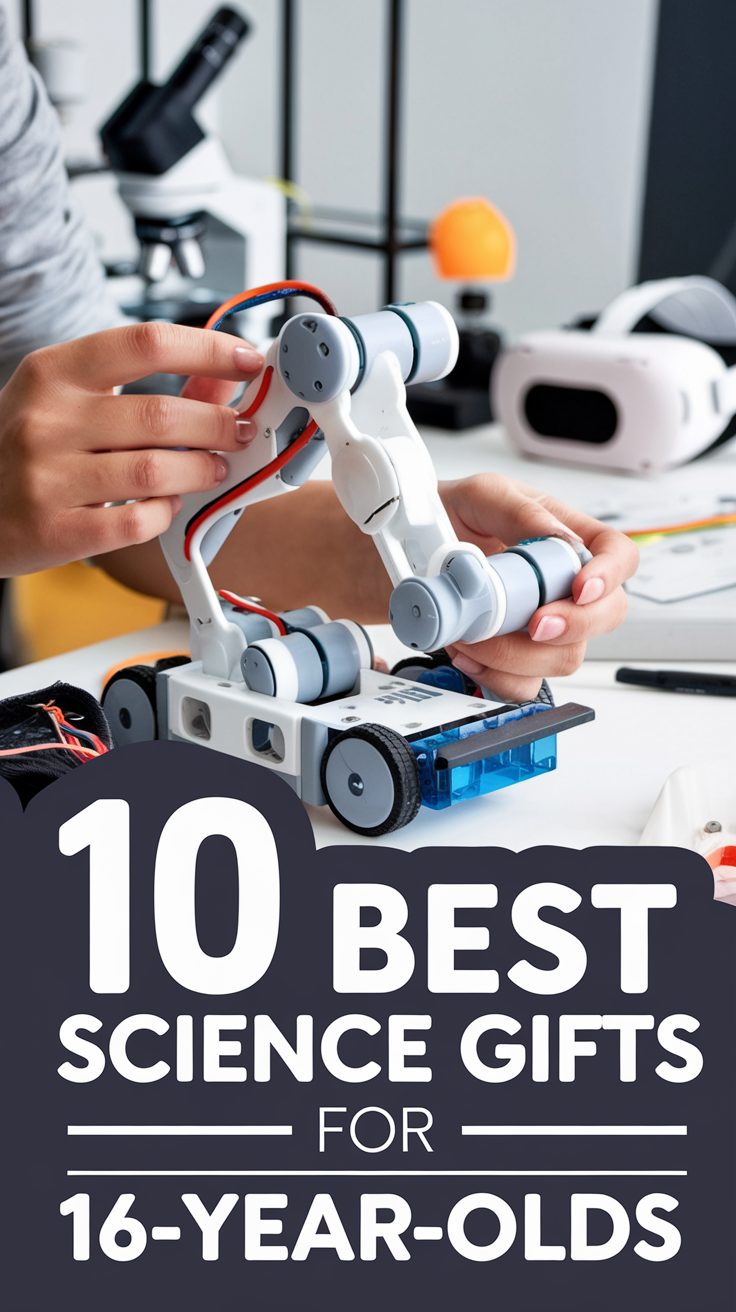
Finding the perfect gift for a 16-year-old can be challenging, especially when you want to combine education with entertainment. Science gifts offer an excellent opportunity to spark curiosity, foster learning, and provide hours of engaging activities. As someone who’s spent years helping families choose educational gifts, I’ve seen firsthand how the right science present can ignite a lifelong passion for discovery. In this comprehensive guide, we’ll explore ten amazing science gifts that are perfect for 16-year-olds, considering factors like interest level, educational value, and entertainment factor.
Why Science Gifts Matter for Teens
The teenage years are crucial for developing critical thinking skills and exploring potential career paths. I remember receiving my first microscope at 16 – it literally opened up a whole new world and influenced my career choice. Science gifts can:
- Encourage analytical thinking and problem-solving skills
- Provide hands-on learning experiences
- Foster creativity and innovation
- Build confidence in STEM subjects
- Create memorable experiences and discoveries
When choosing science gifts for teens, it’s essential to consider their specific interests and existing knowledge level. The best gifts combine educational value with genuine entertainment, making learning feel like an adventure rather than a chore.
1. Advanced Chemistry Sets
Modern chemistry sets have come a long way from the basic kits of the past. Today’s sets offer sophisticated experiments while maintaining safety standards. Based on my experience working with teens, here’s what to look for:
| Feature | Importance | Example |
|---|---|---|
| Safety Equipment | Essential | Goggles, gloves, protective apron |
| Experiment Range | High | 40+ experiments |
| Digital Integration | Medium | App connectivity, online tutorials |
Recommended options include the Thames & Kosmos Chemistry Set 2.0 or the MEL Science Chemistry Kit subscription.
2. Digital Microscopes with Camera
Modern digital microscopes combine traditional observation with digital technology, making them perfect for tech-savvy teens. From personal experience helping my nephew choose one, here are the key features to consider:
- 1000x magnification or higher
- HD camera capabilities
- WiFi connectivity for sharing discoveries
- Compatible software for documentation
- Durable construction for frequent use
3. Coding and Robotics Kits
As someone who’s taught coding to teens, I can’t emphasize enough how engaging robotics kits can be. The best options include:
| Kit Type | Skill Level | Time Investment |
|---|---|---|
| Arduino Starter Kit | Beginner-Intermediate | 10-20 hours |
| LEGO Mindstorms | Intermediate | 15-30 hours |
| Raspberry Pi Set | Advanced | 20+ hours |
4. Virtual Reality Science Experiences
VR technology has revolutionized science education. Popular options include:
– Oculus Quest with science apps
– National Geographic VR Explore
– Space Exploration VR programs
The immersive nature of VR makes complex concepts more tangible and memorable. I’ve seen students grasp difficult concepts much faster through VR experiences than traditional methods.
5. Professional-Grade Telescope
For aspiring astronomers, a quality telescope can be life-changing. Key features to look for:
- 6-inch aperture minimum
- Computerized mount capability
- Smartphone adapter for astrophotography
- Portable design for field trips
- Comprehensive star guide included
6. Science Subscription Boxes
Monthly science subscription boxes provide ongoing engagement and discovery. Popular options include:
– KiwiCo’s Advanced Projects
– Creation Crate Electronics
– MEL Science Chemistry
These boxes typically include everything needed for 2-3 projects per month.
7. Genetic Engineering Kits
Modern biotechnology kits allow teens to explore DNA and genetics safely. Essential components include:
– DNA extraction tools
– PCR simulation materials
– Gel electrophoresis equipment
– Comprehensive safety guidelines
8. Environmental Science Tools
With growing environmental awareness, these tools are increasingly popular:
– Water quality testing kits
– Atmospheric monitoring devices
– Soil analysis equipment
– Renewable energy experiment kits
9. Advanced Scientific Calculator
A good scientific calculator is essential for higher-level math and science. Look for:
– Graphing capabilities
– Programming features
– Statistical analysis tools
– Physics equation solving
Making the Final Choice
When selecting a science gift for a 16-year-old, consider their specific interests, skill level, and potential for long-term engagement. The best gifts combine educational value with genuine entertainment, creating opportunities for both learning and fun. Remember to check safety guidelines and age recommendations for any experimental equipment.
Key Takeaways
- Choose gifts that match the teen’s interests and skill level
- Look for items that combine education with entertainment
- Consider safety features and durability
- Factor in long-term engagement potential
- Include proper guidance and support materials
Frequently Asked Questions
-
What’s the ideal budget for a science gift for a 16-year-old?
The ideal budget ranges from $50-$200, depending on the complexity of the gift. Quality microscopes and telescopes may cost more, while subscription boxes typically start around $30 per month.
-
Are these gifts suitable for beginners?
Most of these gifts come with comprehensive instructions and varying difficulty levels, making them suitable for beginners while offering room for advancement.
-
How can I ensure the safety of chemistry sets?
Look for sets with proper safety equipment, clear instructions, and age-appropriate materials. Adult supervision may be necessary for certain experiments.
-
What if the teen isn’t initially interested in science?
Start with more entertaining options like VR experiences or robotics kits that emphasize fun while incorporating scientific principles.
-
How long will these gifts remain engaging?
Most of these gifts offer months to years of engagement, especially those with expandable capabilities or subscription-based models.
-
Can these gifts help with school work?
Absolutely! Many of these gifts complement high school science curricula and can help improve understanding of classroom concepts.
-
Are there any ongoing costs to consider?
Some gifts, like subscription boxes or chemistry sets, may require replacement materials. Consider these potential additional costs when making your selection.
-
What about warranties and return policies?
Most reputable manufacturers offer warranties on electronic equipment. Check the return policy before purchasing, especially for more expensive items.
-
Can these gifts be shared with friends or siblings?
Many of these gifts are perfect for group activities, fostering collaborative learning and shared discovery experiences.
-
How do I know if a gift is too advanced?
Check age recommendations and read reviews from other parents. Most products include skill level indicators to help guide your choice.
